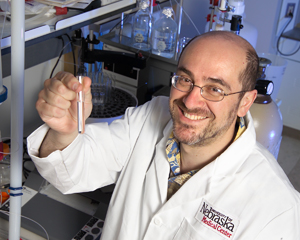 UNMC researcher Alexander “Sasha” Kabanov, Ph.D., Dr.Sc., discusses his work, life and interests.
UNMC researcher Alexander “Sasha” Kabanov, Ph.D., Dr.Sc., discusses his work, life and interests.
NOTE: This profile is part of a series highlighting the researchers who were named UNMC Distinguished Scientists for 2006. Each of these researchers will be profiled in UNMC Today leading up to a March 12 ceremony to recognize their achievements.
- Name: Alexander “Sasha” Kabanov, Ph.D., Dr.Sc.
- Title: Director of the UNMC Center for Drug Delivery and Nanomedicine and
Parke-Davis Professor of Pharmaceutical Sciences, UNMC College of Pharmacy
- Joined UNMC: October 1994
- Hometown: Moscow
Describe your research in 25 words or less.
I develop tiny particles called nanomaterials, which we put in the body in order to deliver drugs precisely to the diseased cell to help with therapy or diagnosis of diseases such as cancer, Parkinson’s, Alzheimer’s and others.
How did you decide to pursue this area of research?
It was 20 years ago. I developed a method to deliver proteins inside the cells when I was a grad student. Someone used my technique and it resulted in the delivery of protein to the brain, which is important. I was invited to work in the health ministry in the Soviet Union to do exactly what I’m doing now.
When did you realize you were interested in research?
I was 14 years old, my main objective was chasing girls and my father was a great scientist. He said “what do you want to do for a living” and I thought if I continued doing what I was I’d end up being a dissident. I wanted a more secure and safe life and said I want to become a scientist like you. I continued chasing girls for a while.
What are the greatest challenges in research today?
In general, the greatest challenge is crossing the borders of disciplines to find research that is highly interdisciplinary. Scientists need to team up to understand each other and cross the borders of discipline. This is more important than ever.
Best advice for new researchers?
You should think very carefully about what you want to do and do something that is most significant since time is short. Don’t waste yourself on what others are doing because it’s popular and obvious. Think very deeply about what you want to do before you make your first move.
When an experiment stalls, what drives you to continue on?
If an idea is wrong, and that happens sometimes, then I think of other ideas. Most of the roadblocks we face suggest there is something missing in our understanding of what we’re dealing with. So, when we hit a roadblock, I start looking at the bigger picture.
Who has been your greatest teacher?
I’ve had a number of outstanding teachers and mentors. I’ve been lucky and privileged to be so close to my father who was just about the greatest scientist and person I’ve known. We published so much together that I would credit him as my biggest teacher in science and life.
Tell us about your family and hobbies outside the lab.
My wife, Tanya, and I have three daughters: Masha, 22, who is studying scriptwriting at UCLA; Dasha, 13, who figure skates; and Natasha, 5. Whatever they are doing is most important to me. Also my mom in Russia is the closest person I have and I speak with her every day on the phone and visit often.
Globally, describe the most notable research achievement ever?
The wheel.
Clarify a common misconception about research?
I do not know about misconceptions, but I’m surprised how much people in the heartland — who are not involved in science and research — know about it. I’m really amazed by how people are interested in what we are doing, how they are ready to learn and how they understand.
What would you tell a student interested in a research career?
I would tell them that it may not pay a lot in terms of money, but you probably will be the happiest person in the world. Happiness is, in part, about achievement and hard work. The challenges and problems are real and will require a lot of effort, but if you’re lucky you might see the fruits of your achievement. You also will travel to wonderful places and meet many interesting people.
List three things few people know about you.
- Few knew I was writing poetry and wanted to become a poet before I became a scientist.
- My mother was a ballerina and I wanted to be a dancer too.
- My great grandfather was a professor of medicine at Moscow University so there is a long family tradition of working at a university associated with medicine and I am proud and happy to work at the medical center.